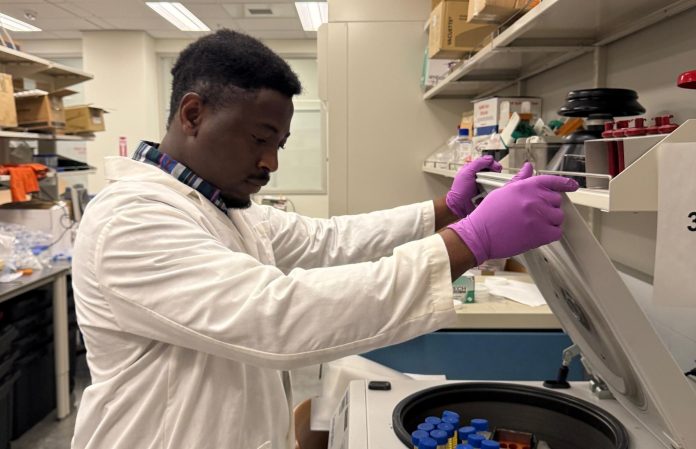In an interview with our reporter Ifuyi Musa, a rising animal scientist, consultant, and graduate student at Purdue University, USA, Olowe Olumide Samuel, speaks about challenges in poultry production and his research-driven intervention that is potentially beneficial to poultry farmers across the globe and in Nigeria in particular. Here are excerpts:
About Olowe Olumide Samuel
Olowe Olumide Samuel is a native of Ilesha, Osun State, Nigeria. He is currently pursuing his graduate studies in Animal Sciences at Purdue University in the United States, where his research focuses on sustainable poultry nutrition.
An overview of academic journey so far
Olumide began his academic journey at Rosemary Comprehensive College in Ilesha before completing his West African Examinations Council (WAEC) certificate in Ibadan. He earned a First-Class degree from the University of Agriculture, Abeokuta. After completing the National Youth Service Corps (NYSC), he proceeded to Vietnam to study Marine Ecosystem-Based Management and Climate Change at Nha Trang University. He returned to Nigeria to work as an aquaculture consultant, notably in Lagos and Yola, assisting farmers with catfish production and farm design. Seeking broader expertise, Olowe moved to Busan, South Korea to study aquaculture at the Food and Agriculture Organization (FAO) World Fisheries University, Pukyong National University. His growing interest in diversified animal production and sustainable food systems led him to Purdue University, where he is now focused on monogastric animal nutrition, especially in chickens.
How personal experiences shape interest in this field
Growing up in Nigeria, Olumide noticed that beef was more expensive than chicken, unlike in some other countries. This observation sparked his interest in poultry as a more accessible protein source. His experiences in aquaculture further fueled his desire to drive similar progress in poultry production. As an aspiring interdisciplinary animal scientist, he sought to expand his understanding of animal systems starting with chickens, whose digestive physiology shares similarities with fish.
Ways work experience informs research in this field
While working on fish farms in Nigeria, Olumide observed the widespread use of antibiotics to treat diseases. Though often effective, this practice contributes to the growing problem of antimicrobial resistance, which is a major public health concern. These experiences underscored the need for sustainable and natural alternatives to antibiotic use in animal farming, a problem his current research aims to solve.
The specific focus of this research
Olumide’s research focuses on using natural feed additives such as probiotics, Enzymes, and seaweed to improve chicken health and performance. He is particularly interested in using these functional additives to reduce reliance on antibiotic growth promoters. His work evaluates growth performance, gut health, and disease resilience in broiler chickens.
The gap the research fills in this field
The global poultry industry is actively seeking alternatives to antibiotics, but many solutions remain expensive or inaccessible to farmers in developing countries. Olumide’s research addresses this gap by investigating affordable and locally adaptable feed additives such as seaweed that can promote health and performance without increasing production costs. His findings support scalable and sustainable approaches to poultry nutrition.
How this research aligns with the food industry in general
This research aligns with the global food industry’s push for sustainable intensification, which involves producing more food with fewer resources and less environmental impact. It contributes to improving animal welfare, and public health, which are now central concerns for consumers and policymakers alike.
Benefits of research for the poultry/food industry in Nigeria
For Nigeria, the implications are especially important. Seaweed-based diets or locally produced additives could help reduce antibiotic misuse, improve poultry farm profitability, and make chicken protein more affordable and accessible. This supports food security goals while also creating opportunities for local additive production and innovation.
Practical steps/guidelines for chicken producers who want to adopt synbiotic approach in chicken production.
A practical starting point is to implement the approach on a small scale and monitor response before moving into larger production. Locally available seaweed species such as Ulva or Gracilaria, which contain fermentable fibers that act as natural prebiotics, can be combined with selected probiotics to form an effective synbiotic strategy. This combination supports beneficial gut microbes and can improve the birds’ growth and immune response. However, to be more effective, collaborating with researchers or agricultural extension agents is recommended to determine proper inclusion rates, formulation, and on-farm application. It is important to note that synbiotics should complement, not replace, good poultry management practices such as proper hygiene, biosecurity, and balanced nutrition, which are fundamental to sustainable and productive chicken farming.










